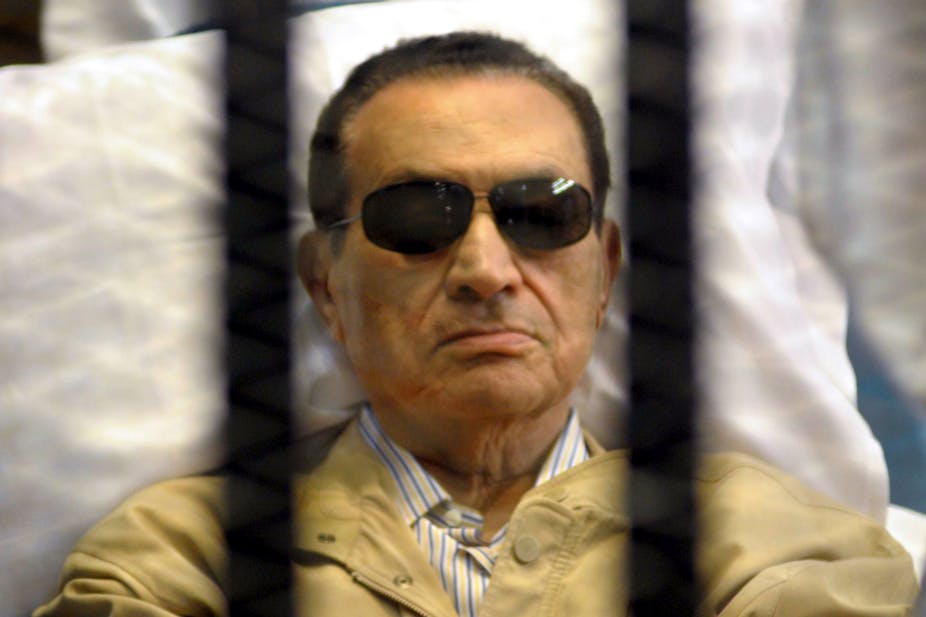Symbols are important, but often deceiving. This is certainly the case of Hosni Mubarak, whose inexorable decline acted as a metronome for the Egyptian political crisis.
In early 2011, Mubarak’s political demise heralded a transition that was widely welcomed as an unprecedented development in the politics of modern Egypt and, more generally, the Arab world. Now, 16 months later, rumours surrounding his physical decline have coincided with another defining moment in Egyptian politics: the celebration of the first “free” presidential election ever held in the country.
Yet Mubarak’s departure from the epicentre of power and his anticipated (yet not substantiated) death are little more than symbolical benchmarks in the evolution of Egyptian politics.
Mubarak’s regime can be said to have survived him and his last Prime Minister, Ahmed Shafiq, might still replace him at the helm of the Egyptian state.
A “Mubarak free” Egypt was expected to become a fairer and more free place. His demise, however, did not instigate any substantial improvement in Egyptian governance. Corruption, unaccountability and, more worryingly, the persistence of a de facto military dictatorship continue to characterise Egyptian politics in June 2012, just as they did in January 2011. With or without Mubarak, Egypt remains in a confused political and economic state.
And it is perhaps this focus on Mubarak that has, to date, been an obstacle to our understanding of the Egyptian revolution.
The personalisation of the Egyptian uprising – Tahrir Square protesters versus Mubarak, mass-good versus individual evil – prevented a proper appreciation of the revolution’s outcome.
In early 2011, the rhetoric of Tahrir Square identified Mubarak’s departure as the preferred outcome of the uprising. Although the people demanded the downfall of the entire regime, the political opportunity of the moment convinced revolutionary forces that Mubarak’s exit was a satisfactory condition for the establishment of a viable transition.
The secular opposition preferred to maintain its collective approach to post-revolutionary politics, failing to express a compromise candidate for the presidential election of mid-2012. The Muslim Brotherhood, on the other hand, adopted a more propositional posture in the post-Mubarak landscape, and emerged as the only successful anti-regime force in transitional Egypt.
This scenario favoured the consolidation of an initially impersonal regime, which hid behind the emergency facade of the Supreme Council of Armed Forces and, with the support of the Constitutional Court, manifested its power through Shafiq and other regime remnants.
The political experience of the past 16 months has taught us that Mubarak was only the tip of the iceberg, as the power interests he represented (and protected) did indeed survive him and, most recently, launched a bid to replace him.
His demise was the inevitable price to be paid to preserve the privileges held by the military leadership and the politico-economic elite that thrived under him. Egyptian governance, in June 2012, is best described as the synthesis of a military dictatorship and a neo-Mameluk oligarchy.
Let’s put this in the wider context of the other nations that were part of the Arab Spring.
There is no much hype surrounding former Tunisian President Zine El Abidine Ben Ali’s fate, as his role in post-revolutionary Tunisia is virtually irrelevant.
In post-revolutionary Libya, Muammar Gaddafi’s family has been stripped of virtually all privileges and very few observers speculate on the whereabouts of the dictator’s surviving children - with the notable exception of former regime spokesperson Saif al-Islam.
But Mubarak – through the power he represented and his resurgent family – has remained a significant character within the Egyptian political landscape even after his fall.
This can explain the anger of Egyptian protesters over the “mere” life sentence handed to Mubarak for his role in repressing of Egyptian opposition during his reign.
But as the political demise of its former dictator could not bring closure to Egypt, his death might appease the population and seal an emotional chapter connected with 30 years of oppressive power.
There are parallels here between Mubarak and Gaddafi, whose brutal death represented the conclusive end of the Libyan revolution.
In post-revolutionary contexts, the death of an ostracised dictator is regarded as a defining moment.
But this might not be the case in Egypt, where the substantive failure of the revolutionary movement and the fragmentation of anti-regime forces have led to a paradoxical scenario. The ancien regime could manage to return to power exactly when its former leader passes away.

